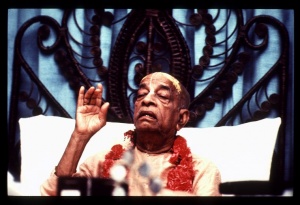CC Adi 17.258: Difference between revisions
No edit summary |
(Vanibot #0054 edit - transform synonyms into clickable links, which search similar occurrences) |
||
| Line 17: | Line 17: | ||
<div class="synonyms"> | <div class="synonyms"> | ||
''tathāpi'' | ''[//vanipedia.org/wiki/Special:VaniSearch?s=tathāpi&tab=syno_o&ds=1 tathāpi]'' — still; ''[//vanipedia.org/wiki/Special:VaniSearch?s=dāmbhika&tab=syno_o&ds=1 dāmbhika]'' — proud; ''[//vanipedia.org/wiki/Special:VaniSearch?s=paḍuyā&tab=syno_o&ds=1 paḍuyā]'' — students; ''[//vanipedia.org/wiki/Special:VaniSearch?s=namra&tab=syno_o&ds=1 namra]'' — submissive; ''[//vanipedia.org/wiki/Special:VaniSearch?s=nāhi&tab=syno_o&ds=1 nāhi]'' — not; ''[//vanipedia.org/wiki/Special:VaniSearch?s=haya&tab=syno_o&ds=1 haya]'' — become; ''[//vanipedia.org/wiki/Special:VaniSearch?s=yāhāṅ&tab=syno_o&ds=1 yāhāṅ]'' — any where; ''[//vanipedia.org/wiki/Special:VaniSearch?s=tāhāṅ&tab=syno_o&ds=1 tāhāṅ]'' — everywhere; ''[//vanipedia.org/wiki/Special:VaniSearch?s=prabhura&tab=syno_o&ds=1 prabhura]'' — of the Lord; ''[//vanipedia.org/wiki/Special:VaniSearch?s=nindā&tab=syno_o&ds=1 nindā]'' — accusation; ''[//vanipedia.org/wiki/Special:VaniSearch?s=hāsi’&tab=syno_o&ds=1 hāsi’]'' — laughing; ''[//vanipedia.org/wiki/Special:VaniSearch?s=se&tab=syno_o&ds=1 se]'' — they; ''[//vanipedia.org/wiki/Special:VaniSearch?s=karaya&tab=syno_o&ds=1 karaya]'' — do. | ||
</div> | </div> | ||
Latest revision as of 18:40, 19 February 2024
Śrī Caitanya-caritāmṛta - Ādi-līlā - Chapter 17: The Pastimes of Lord Caitanya Mahāprabhu in His Youth

His Divine Grace
A.C. Bhaktivedanta Swami Prabhupada
A.C. Bhaktivedanta Swami Prabhupada
TEXT 258
- tathāpi dāmbhika paḍuyā namra nāhi haya
- yāhāṅ tāhāṅ prabhura nindā hāsi’ se karaya
SYNONYMS
tathāpi — still; dāmbhika — proud; paḍuyā — students; namra — submissive; nāhi — not; haya — become; yāhāṅ — any where; tāhāṅ — everywhere; prabhura — of the Lord; nindā — accusation; hāsi’ — laughing; se — they; karaya — do.
TRANSLATION
But the proud student community did not become submissive. On the contrary, the students spoke of the incident anywhere and everywhere. In a laughing manner they criticized the Lord.